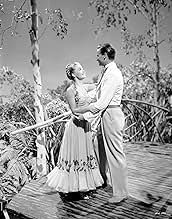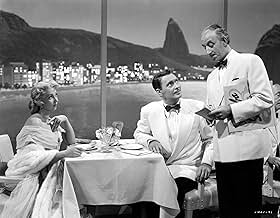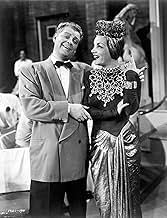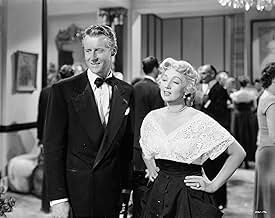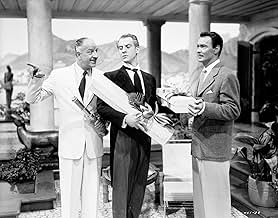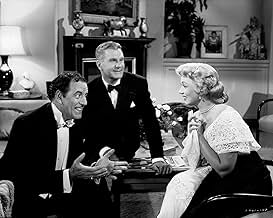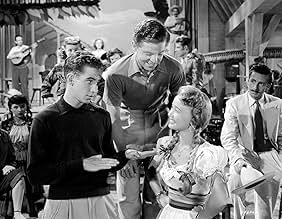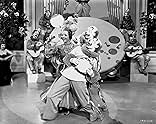CALIFICACIÓN DE IMDb
6.4/10
661
TU CALIFICACIÓN
Una madre y su hija compiten por el mismo papel de cantante y, sin que la otra lo sepan, por el mismo hombre.Una madre y su hija compiten por el mismo papel de cantante y, sin que la otra lo sepan, por el mismo hombre.Una madre y su hija compiten por el mismo papel de cantante y, sin que la otra lo sepan, por el mismo hombre.
- Dirección
- Guionistas
- Elenco
Jean Andren
- Party Guest
- (sin créditos)
Carlos Barbe
- South American Man
- (sin créditos)
Leon Belasco
- Professor Gama
- (sin créditos)
Nita Bieber
- Specialty Dancer
- (sin créditos)
Irene Booth
- Party Guest
- (sin créditos)
Opiniones destacadas
Great production values highlight this musical comedy that revolves around a pair of misunderstandings that blossom to full effect.
With her Debbie Reynolds looks and her operatic voice, Jane Powell is wonderful as 17-year-old Nancy Barklay, a budding actress. Her mother, Frances--also an actress--is played by Ann Sothern. The two of them are wonderful together. In fact the entire cast fits together nicely in this light-hearted story that deals with music more than romance. Barry Sullivan plays Paul Berten, the man who sort of comes between them. Louis Calhern is Frances' father, an old song and dance man himself. Carmen Miranda goes full fruit basket with a couple of catchy tunes. Hans Conreid is underused as the family butler.
Technicolor brightens the screen and shows off some great sets, especially the family home in Rio. The wardrobe is striking.
Jane Powell gets to display her classical credentials with a solo from La Boheme.
"Nancy Goes to Rio" is an enjoyable excursion designed to put a smile on the face of viewers. And it does just that.
With her Debbie Reynolds looks and her operatic voice, Jane Powell is wonderful as 17-year-old Nancy Barklay, a budding actress. Her mother, Frances--also an actress--is played by Ann Sothern. The two of them are wonderful together. In fact the entire cast fits together nicely in this light-hearted story that deals with music more than romance. Barry Sullivan plays Paul Berten, the man who sort of comes between them. Louis Calhern is Frances' father, an old song and dance man himself. Carmen Miranda goes full fruit basket with a couple of catchy tunes. Hans Conreid is underused as the family butler.
Technicolor brightens the screen and shows off some great sets, especially the family home in Rio. The wardrobe is striking.
Jane Powell gets to display her classical credentials with a solo from La Boheme.
"Nancy Goes to Rio" is an enjoyable excursion designed to put a smile on the face of viewers. And it does just that.
Can't help liking a musical that features silly lyrics like: "Nancy goes to Rio - Me-oh, my-oh, me-oh" and "Keep the Latins guessing!". How crude - sometimes enjoyably crude - Hollywood's image of foreign lands and sounds! I lived in Sao Paulo for a year (1962), and I don't remember seeing any Latins. Instead, there were a lot of fellow human beings. The best song in the movie was written by a "Latin": Mexican genius Maria Grever, so sadly forgotten. She wrote American standards like "What a Difference a Day Makes". Jane Powell is great, as usual, and so is Scotty Beckett. His life was one of the saddest Hollywood tragedies, probably a case of undiagnosed depression. Yet he looks so happy and confident on screen, more so than most major stars. This silly musical is not as good as "A DATE WITH JUDY", but it will do just fine. Enchantment guaranteed.
A so-so musical comedy, chipper and competently shot on the studio back lot far, far away from Rio. If there's any reason to watch this corny confection, it would be for the show-stopping number by Carmen Miranda in the nightclub. The hues alone are incredible! Everything is dripping in rich, over-saturated color - the costumes, the set - it's like an explosion at the Technicolor factory. The production designer and director were surely using the process to "wow" the audience used to common, flatter black and white films for so long, similar to the 3D process that would come along later. Inside this gem of a scene is Miranda's dance performance, which is really energetic and quite imaginative. If you ever wanted to test your TV screen color and balance, this scene from this piece of 50s flash might be the one to do that with. The rest of the film? Meh... hokum, but quaint.
Sidney Sheldon wrote the screenplay based on an earlier film that starred Deanna Durbin, but this time tedium sets in rather early. In short, it's an uninspired remake designed to bring bubbly JANE POWELL, ANN SOTHERN, CARMEN MIRANDA, BARRY SULLIVAN and LOUIS CALHERN together for what is supposed to be a light-hearted romp.
For a musical, there is too long a gap between dialog and songs and none of the songs are especially memorable. The sets are opulent, the costumes are tastefully designed with no expense spared on wardrobe, and the color is splendid. But the story is the one about a mother and daughter actress team who are both in love with the same man, unknown to each other, until the plot complications are straightened out.
Whatever sparkle there was to the original B&W film has been dampened by a dull script, slow-paced direction and some coy performances from Sothern and Powell. Powell postures as a would-be actress but her artificial poses are contrived and obvious which makes Sullivan suspecting that she's a girl "in trouble" (when she's really rehearsing a part) seem a strain on credibility.
Both Sothern and Powell are given the usual MGM glossy close-up treatment, but the silly plot defeats everyone.
Rio is strictly a fabrication on an MGM sound stage. Only CARMEN MIRANDA's lively musical contributions make watching this worthwhile. That, and a nice, understated, low-key performance from the always reliable BARRY SULLIVAN saves the comic moments from being downright foolish.
For a musical, there is too long a gap between dialog and songs and none of the songs are especially memorable. The sets are opulent, the costumes are tastefully designed with no expense spared on wardrobe, and the color is splendid. But the story is the one about a mother and daughter actress team who are both in love with the same man, unknown to each other, until the plot complications are straightened out.
Whatever sparkle there was to the original B&W film has been dampened by a dull script, slow-paced direction and some coy performances from Sothern and Powell. Powell postures as a would-be actress but her artificial poses are contrived and obvious which makes Sullivan suspecting that she's a girl "in trouble" (when she's really rehearsing a part) seem a strain on credibility.
Both Sothern and Powell are given the usual MGM glossy close-up treatment, but the silly plot defeats everyone.
Rio is strictly a fabrication on an MGM sound stage. Only CARMEN MIRANDA's lively musical contributions make watching this worthwhile. That, and a nice, understated, low-key performance from the always reliable BARRY SULLIVAN saves the comic moments from being downright foolish.
For practically the whole of Ann Southern's career she was predestined to be considered a competent, reasonably popular actress. In fact, she was considerably more than that and this film, until much later in her career, is the proof. The plot about an actress Mother (Southern) and her singing daughter (Powell) is two steps above hokey but the realization gives it status and sturdy performances in support carry the day. A subplot that has everything thinking the daughter might be with child was semi-shocking for the time but, today, might make one wonder what the fuss was about. The completely artificial looking sets-Rio as painted on a scrim-leave no doubt that this was filmed on the back lot.(And that illusion isn't helped by some included footage actually shot in Rio during Carnival.) But the singing and dancing are fun to watch, Jane Powell is in particularly good voice, and the thin plot just carries the day. But only just. Need I mention the happy ending? Did you think otherwise? So join Ann and the cast for a spurious adventure in Rio and remind yourself what good actors can do with very modest material.
¿Sabías que…?
- TriviaThis is a remake of the Deanna Durbin film Dulce ilusión (1940). Both films were produced by Joe Pasternak, and in both the young star --- Jane Powell in this version --- sings "Musetta's Waltz" from Giacomo Puccini's opera "La Boheme."
- ErroresAt dinner Nancy is advised to take calcium to prevent scurvy. Scurvy is caused by a Vitamin C deficiency, not a calcium deficiency, and takes 2-3 months to develop.
- Citas
Paul Berten: He double-crossed me, hit me when I was looking.
- Créditos curiososMiss Miranda accompanied by Bando da Lua
- Versiones alternativasA whole musical number, "Mention My Name In Sheboygan," performed by Jane Powell and Scotty Beckett, was ultimately cut from the final film. Clips of this scene are still in existence.
- ConexionesFeatured in That's Entertainment! III (1994)
- Bandas sonorasTime and Time Again
Written by Fred Spielman and Earl K. Brent
Performed by Ann Sothern (uncredited) and Danny Scholl (uncredited)
Selecciones populares
Inicia sesión para calificar y agrega a la lista de videos para obtener recomendaciones personalizadas
Detalles
- Tiempo de ejecución1 hora 40 minutos
- Relación de aspecto
- 1.37 : 1
Contribuir a esta página
Sugiere una edición o agrega el contenido que falta

Principales brechas de datos
By what name was Pasión carioca (1950) officially released in India in English?
Responda

